For any computer enthusiast, the most attractive feature of the Gigabyte 3D Aurora 570 is that it's watercooling ready out of the box. At the back of the case you'll find two black rubber pass-throughs. These aren't high tech roach traps, or mini cup holders, they are for watercooling tubing up to 2.5cm or 1" in diameter to enter and exit the case via.
|
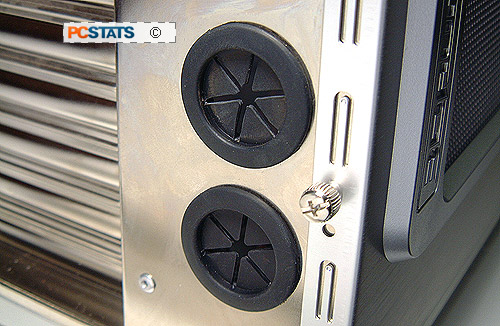
The rubber passthrough holes are 2.5 cm in diameter which is
large enough for even high end watercooling
systems.
|
The rubber pass-throughs were designed with Gigabyte's own watercooling system in
mind, but the idea works with any other watercooling kit as well. Just above the PCI brackets are two 120mm exhaust fans (both are blue LED illuminated) which are held in place with vibration absorbing rubber posts. The idea is that a single 120mm sized radiator can be installed just behind these fans, and the exhaust airflow from the case harnessed for cooling without adding any additional noise.
|
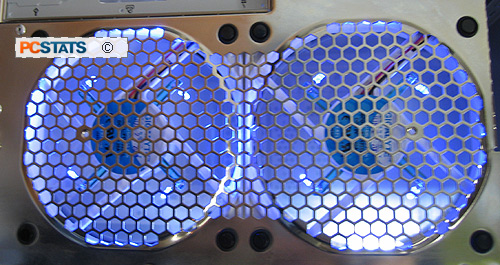
Gigabyte equips the 3D Aurora 570 with two 120mm
exhaust fans which glow blue when running. The fans are very quiet, and are mounted to the chassis with
rubber vibration absorbing posts. With the compatible Gigabyte watercooling system, a
single/dual
120mm watercooling radiator is mounted over these fans. Gigabyte has really built
the 3D Aurora 570 with watercooling in mind.
;-)
|
The 120mm fans
move air through honeycomb vents, which are said to be among the
best punched metal style. In the full profile picture of the Gigabyte 3D Aurora 570 case below you'll note that the entire back panel is nickel plated steel. This ensures screw threads don't strip. The third 120mm fan and dust filter are visible when the front bezel of the 3D Aurora 570 has been removed. The actual frame of the chassis is not anodized, just the outer panels.
|
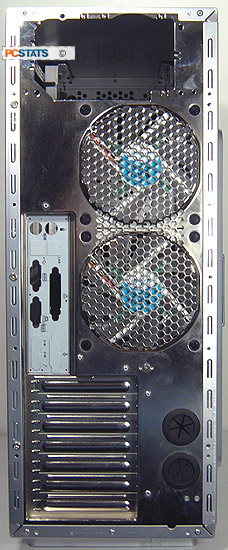 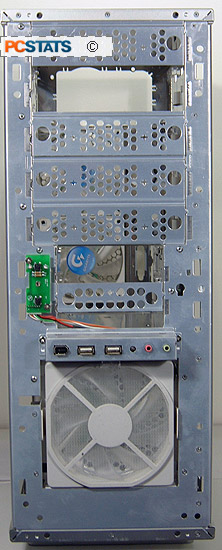
The
aluminum panels on the case are all anodized. The rear of the 3D
Aurora 570 is made of 1mm thick SECC steel which has been nickel plated
to inhibit corrosion that would occur when two dissimilar metals come
in contact like this. Steel was selected
because it adds strength, and screw holes
tend to last longer. The 570 measures 20cm wide and 52cm
tall.
|
The right side of the case (when the front bezel is
facing you) is completely featureless and there is no reason to take that side
panel off unless you need to also remove the front bezel and do a dusting. Let's
take a look inside the Gigabyte 3D Aurora 570 case next...
Inside the Gigabyte 3D Aurora 570 case there is a ton of space to work with. Full sized desktop ATX motherboards are 244mm in length, so there's still plenty of room to spare.
|
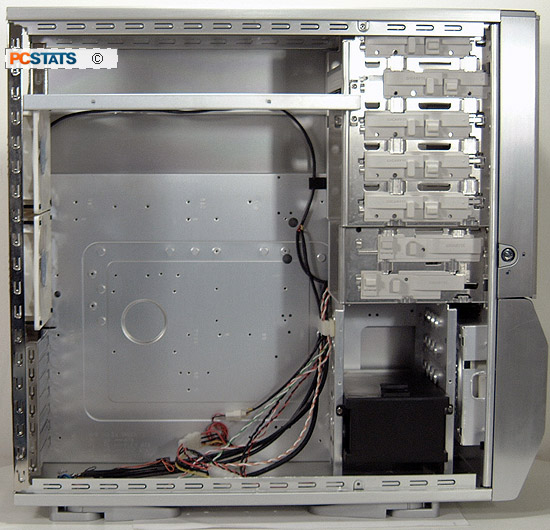
Computer hardware enthusiasts will like this, there is
plenty of space to work with inside the Gigabyte 3D Aurora 570. You cannot
remove the motherboard tray but that shouldn't matter as you can easily
fit a full sized ATX motherboard in without any difficulty.
Don't forget to install the brass standoffs onto the motherboard tray in the correct pattern so
all the screw holes on the motherboard line up! We've seen boards shorted by
incorrectly positioned standoffs... A motherboard the size of 33 x 34.3 cm
in size can be installed into the 3D Aurora 570
case.
|
Motherboards mount to small brass stand offs, which you will need
to install on the non-removable motherboard tray first. Heck, you could
probably even install a workstation or server motherboard in here without running out of space... The 5.25"
optical and 3.5" floppy drives use captive tooless mechanisms to install. It's
hard to believe that in the old days one used to have to screw in each optical drive or hard drive with actual case screws. The tooless mechanism has a firm grip, and is lockable so computers in transit shouldn't fear drives flying loose.
|
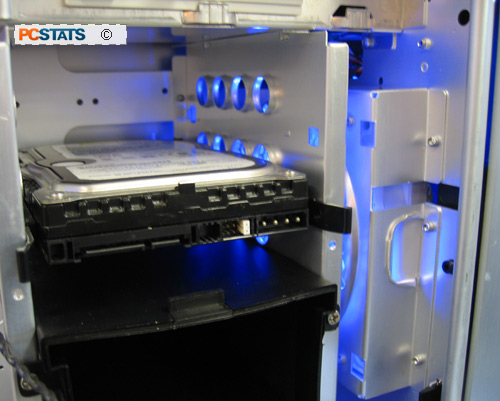
There are three
hidden 3 1/2" drive bays for hard drives, five if you remove the tool box.
Since modern hard drives can get quite warm during operation, venting
ensures good airflow from the front 120mm case intake fan. The HDD's snap
in place thanks to the tooless drive
rails.
|
The black box at the bottom is the "tool box" for holding extra parts. If you
need the space for actual hard drives it removes in a jiffy. On the topic of
rounding over all the sharp edges, and corners in here, Gigabyte has one done a
so-so job.
